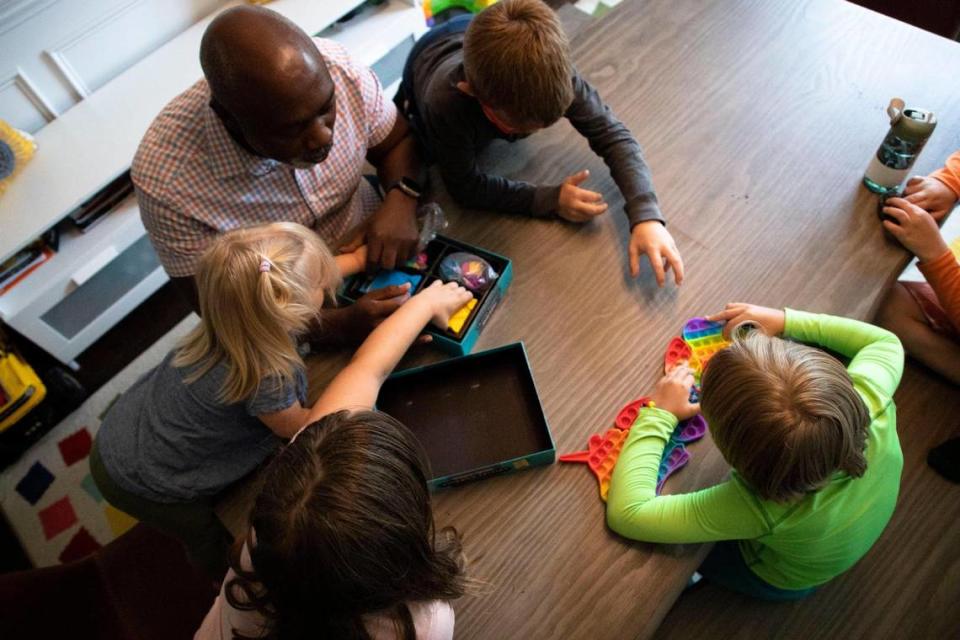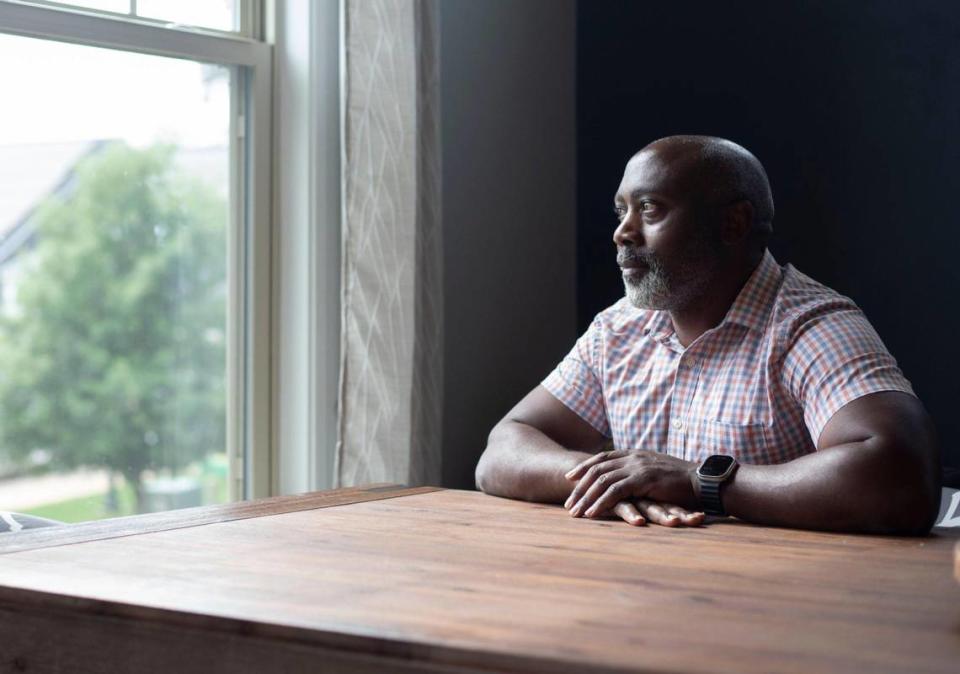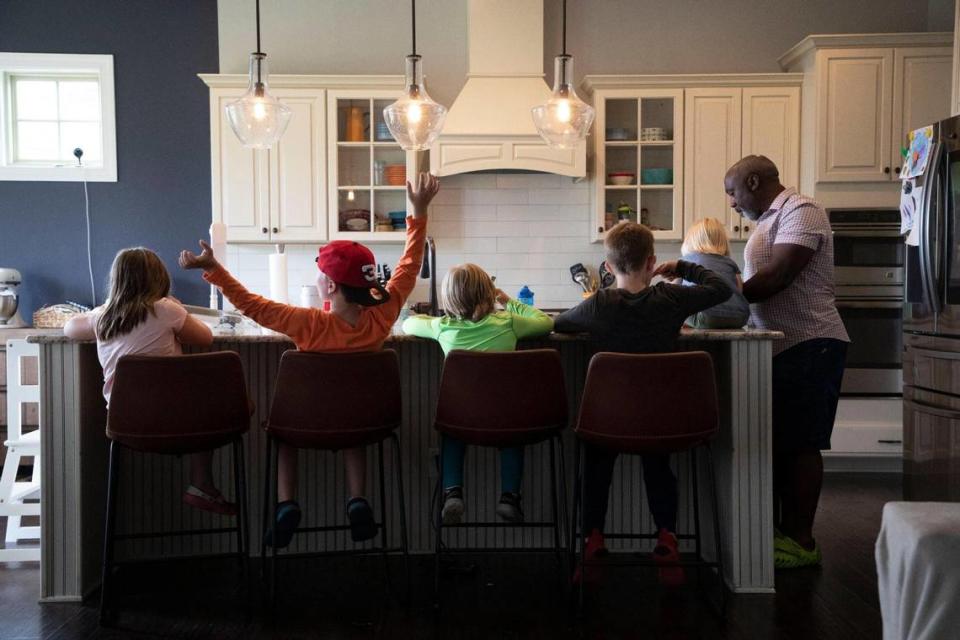‘I want to change the narrative’: Why this Charlotte dad dedicates his life to fostering children
The first thing you hear after ringing the doorbell at Peter Mutabazi’s house near Lake Wylie is the pitter-patter of little feet. Then, a head of blond hair appears at the bottom of the front door windows. A 2-year-old girl looks up through the glass with bright blue eyes.
She had just nearly been trampled by a labradoodle and goldendoodle — each double her size — but she still smiles eagerly, showing off the crumbs of a recent snack at the corners of her lips, as she fumbles to turn the doorknob.
Toys are scattered along the entryway: Barbie dolls, a rainbow unicorn Pop It, abandoned board games and coloring books. Dog barks echo over the sound of the living room TV and children playing upstairs.
It’s all a little crazy, but this house is full of life.
That’s just how Peter Mutabazi, 49, prefers it, and what it’s been like since he became a foster parent in 2016. Since then, he has fostered 34 children between living in Charlotte and Oklahoma City. He currently has five foster children ranging in age from 2 to 9 living at his home, along with his 17-year-old adopted son.
“There is so much joy knowing that I can provide a safe and loving home for these kids,” Mutabazi says.

Caring for 34 foster children isn’t common — especially within the span of seven years. Neither is the fact that Mutabazi is African American and a single man.
Not every day is entirely joyous, however. Some are difficult, dealing with the stress, tears and challenges of raising children that all parents are familiar with. And a single father like Mutabazi takes on an additional load with the loneliness and pressure of doing it all himself. But for him, it’s all worth it.
From street kid to foster parent
It’s worth it because Mutabazi knows what it’s like to experience a childhood riddled with trauma and hardships. Someone helped him 35 years ago, and he’s trying to pay it forward by helping other children.
Mutabazi grew up in a rural town in southwest Uganda called Kabale, living among widespread sickness and hunger with his four younger siblings. But in those conditions, he had no solace at home: His father was physically and verbally abusive, Mutabazi says, to the point where he feared for his life.
He ran away from home at 10 years old, without saying goodbye to his siblings or mother.
“I had no interest in telling them,” Mutabazi says. “I just wanted to get away.”

He made his way to Kampala, Uganda’s capital city that is more than 250 miles from his hometown. There, he lived on the streets. He stole from locals and dug through garbage for food as a means of survival.
Then one day, a driver of a familiar car began offering him food and clothes.
This stranger — named James — and his wife ultimately helped Mutabazi enroll in boarding school when he was 14. The couple acted as his unofficial foster parents throughout his schooling, providing a nurturing family environment — something once foreign to Mutabazi. Their kindness changed the trajectory of his life.
“I adored (my ‘foster’ parents) so much that I wanted to be like them,” Mutabazi says.
So, he did.
Dealing with scrutiny as a foster parent
Mutabazi is an immigrant and a single Black man with no kids of his own — an anomaly within the foster parent community. The NC Department of Health and Human Services says 31.3% of licensed foster parents are Black or African American and 21.7% are of a one-parent household.
Once, at a foster parent class, Mutabazi entered a room of married couples and was asked, “Is your wife joining late?” He has never been married. The idea of a single man as a foster parent appeared hard for people to wrap their head around.
But Mutabazi considered it his calling. When he first started as a foster parent, friends told him they didn’t think it was right for him, because “those kids are bad.” But, back in Uganda, Mutabazi was one of “those kids.”
“I don’t think they realized how harmful those comments were to me,” Mutabazi says. “For them to say these children don’t deserve a good dad, it hurt.”
This foster dad has found an opportunity to redefine what a family could look like. And that started with unlearning his own prejudices.
Mutabazi once assumed he’d be fostering kids who were African American and Native American, since he understood those to be the most marginalized demographics.
That’s why his first placement — which occurred on the same day he earned his foster parent license — came as a surprise. The 5-year-old boy who arrived at his home in 2016 had the blondest hair and bluest eyes Mutabazi had ever seen.
That was when he lived in Oklahoma City, where the white population is 4.7 times larger than the Black population. Neighbors would see Mutabazi and his foster son playing in the front yard and ask, “Where are his parents?” or “Do you have babysitting services?”
Since then, 19 of Mutabazi’s 34 foster children have been white, including his six kids at home now. Nine have been Black, three were Latino and one was Native American. People seldom believe he is his children’s father.
Like on one family trip to Costco, his kids roamed around the food sample stations. The employees asked the children where their parents were. Mutabazi was right behind his kids all along, pushing the shopping cart.
“They always disregard me,” he says.
Juggling a house full of kids (that people never think are his own) can be a lot to handle, Mutabazi admits. While he has the occasional help of babysitters and respite foster care, he lacks a partner to help with day-to-day parenting.
“I would love to be married,” Mutabazi says. “But it’s not a priority.”
Mutabazi doesn’t have a wife or biological kids of his own, but instead has devoted his life to a new type of family.
“Family is who you love,” Mutabazi says. “Family is when you open your door to let anyone come in, no matter what they look like.”
The technicalities of the foster system
Mutabazi moved from Oklahoma City to Charlotte in 2018 and became a U.S. citizen the year after. In Oklahoma, he fostered 15 kids; he’s fostered 19 since moving to North Carolina.
Foster parents in the U.S. receive a monthly stipend for each kid in their home. The money comes from federal, state and county funds. North Carolina foster parents receive rates of $514, $654 and $698 for kids aged 0-5, 6-12 and 13+ respectively, according to FosteringNC.org — meaning Mutabazi currently receives $3,100 each month to help with expenses for his kids.
While taking in more foster kids — thereby getting a higher reimbursement — might create doubts of his motivations, Mutabazi says the money barely scratches the surface of what he spends on his children.
“I would do it even if the system didn’t have a penny to pay me,” he says. “Also, to become a foster parent, you need a job. The system must know you are not depending on the kids.”
Before becoming a foster parent, Mutabazi worked with humanitarian organizations advocating for children across the world. After earning his foster license, he transitioned his career to flipping houses. He now manages contractors who facilitate the home renovations, so he can work from home and be more available to his kids.
The joys — and complexities — of a full house
Outside of his Charlotte home, four kids race around the block on their scooters. As his eldest daughter speeds down the hill, one of his sons does a jump trick off the curb. They yell after each other, laughing as they roll by. Even the toddler tries a scooter for herself, holding onto Dad’s arms as he steers the way.
All smiling and out of breath, the kids file inside, migrating toward the kitchen and a promised ice cream treat. A pile of Razor scooters remains on the front steps, gleaming in the sun.
Mutabazi describes his home as “kid-friendly for every child,” as he passes his dining room with shelves spilling over with toys and games on every wall.
Even among the clutter, Mutabazi feels most at home in a full house, with open doors.
“The more kids I can love, the more I can help,” he says.

Mutabazi was drawn to help foster children after his own experiences with trauma, abuse and neglect. Most kids in the foster system are removed from their homes due to neglect and parental drug abuse, partially fueled by the opioid epidemic, according to ChildTrends.org and North Carolina Health News.
“What other parents find extremely difficult or confusing, I find it relatable,” he says.
He recalls a time finding a child hiding snacks in their bed. Instead of lecturing about attracting ants throughout the house, Mutabazi recognized that as a response to previous food insecurity — and decided that a coping mechanism is nothing to be shamed for.
“I have to earn the right to know what they went through,” Mutabazi says. “I do not ask, but I create a space for them to feel safe.”
His kids often bond so deeply with each other, that there’s a sense of abandonment when one is placed in permanent care. Because of this, every three months, Mutabazi reconnects former foster kids with those still living in his home.
“I do this so they feel like their friends didn’t leave, that everyone in their lives isn’t leaving,” he says.
His goal in fostering kids has always been for them to return to their birth parents or an adoptive family, so saying goodbye is bittersweet.
Through the hardest parts of foster parenting, Mutabazi still finds reminders in the smallest interactions with his kids that reaffirm he’s doing the right thing.
“When I tuck a kid into bed and they say, ‘Dad, I love you,’ or ‘this is the best place I’ve ever lived,’ that really warms my heart,” Mutabazi says.


